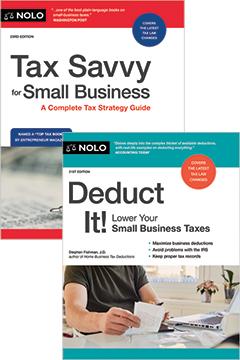While employees can no longer deduct their work at home expenses, make sure you know how you might get reimbursed for these costs, including as qualified disaster relief payments.
Due to the coronavirus (COVID-19) pandemic, millions of employees who ordinarily work at an office or other workplace provided by their employers are now working at home. While you can no longer get a tax deduction for work-at-home expenses, here are some other ways you can get reimbursed for these costs, including as qualified disaster relief payments.
Tax Deduction for Employees' Work at Home Expenses Eliminated Under TCJA
Prior to the Tax Cuts and Jobs Act (TCJA), which took effect in 2018, employees who worked at home for the convenience of their employer could get a tax deduction. This was a miscellaneous itemized deduction that could only be claimed by employees who itemized their personal deductions on IRS Schedule A. And it was available only if, and to the extent, it and any other miscellaneous deductions exceeded 2% of the employee's adjusted gross income.
The TCJA temporarily eliminated all miscellaneous itemized deductions, including the deduction for employee home offices. The deduction is scheduled to return in 2026. Thus, unless the law is changed, employees who are working at home in 2020 due to the coronavirus pandemic won't get a tax deduction for those costs.
Reimbursement May Be Required by Law
All is not necessarily lost for employees forced to work at home. They can ask their employer to reimburse them for their home office expenses. In some states employers are required by state law to reimburse their employees for their necessary job expenses. These include California, Illinois, Iowa, Pennsylvania, Montana, and New Hampshire.
In addition, the federal Fair Labor Standards Act (FLSA) prohibits employers from requiring employees from paying for job-related expenses if doing so would cause the employee's wage rate to fall below the minimum wage or overtime compensation rate.
Even if such reimbursement is not required by law, the employer may be willing to provide it anyway. It can only help with employee morale and productivity in this time of crisis. Moreover, such a reimbursement can be tax free to the employee and fully deductible by the employer.
Reimbursements as Tax-Free Employee Benefit
The tax law permits employers to reimburse employees for legitimate job-related expenses, including home offices that meet the requirements for the home office deduction.
To qualify for the home office deduction, the employee must regularly and exclusively use a portion of his or her home for work--it need not be a whole room. And the home office must be for the employer's convenience. Employees forced to work at home due to the coronavirus qualify.
An employee may be fully reimbursed for any items purchased just for the home office, such as a computer, monitors, printer, internet service, or other equipment. But, if the employer later converts any of these items to personal use, he or she would presumably have to pay tax on their value.
The employee can also be reimbursed for a portion of the expense of maintaining his or her home. The employee must calculate what percentage of the home is used as the office--this area must be used exclusively for the office. The employee can be reimbursed for the home office percentage of rent or mortgage expenses, depreciation, utilities, and other costs of maintaining the home.
Example: Mario is an employee forced to work at home due to the coronavirus for two months. He exclusively uses 10% of his apartment as his office. He pays $2,000 in monthly rent and utilities. His employer reimburses him $400 for the two months. The $400 is tax-free to Mario and deductible by his employer.
Accountable Plan Required
To be tax-free, such reimbursement must be made under an "accountable plan." An accountable plan is a set of procedures that ensures that employees don't get reimbursed for personal expenses. In brief, the employee must:
- make an "adequate accounting" of the expense—that is, follow all the applicable recordkeeping and other substantiation rules for the expense
- timely submit your expense report and receipts to their employer, and
- timely return any payments that exceed what the employee actually spent for job expenses.
Such a plan need not be in writing. If the employee fails to follow the rules, any reimbursements must be treated by the employer as employee income subject to tax. Thus, the employer must include the amount as taxable wages on the employee's W-2.
Reimbursement as Qualified Disaster Relief Payments
There's another way an employer could make tax-free reimbursements of an employee's home office expenses. They could be characterized as qualified disaster relief payments. A provision of the tax law (IRC Sec. 139) allows employers to make tax-free payments to employees to reimburse or pay them for reasonable and necessary personal, family, living, or funeral expenses they incur due to a national emergency. The coronavirus pandemic has been declared such an emergency.
Such qualified disaster payments would certainly include reimbursing employees for any out-of-pocket expenses incurred in setting up a home office, such as equipment, internet, cell phones, and other expenses. Could they also include a portion of an employee's mortgage or rent? This is not entirely clear. This provision of the tax law has been rarely used.
One advantage of qualified disaster relief payments is that they need not be made under an accountable plan. Indeed, virtually no recordkeeping is required by the IRS.



